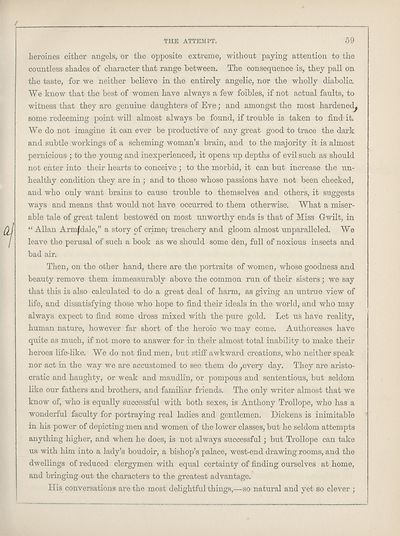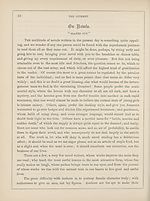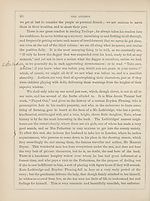Download files
Complete book:
Individual page:
Thumbnail gallery: Grid view | List view

THE ATTEMPT. 59
heroines either angels, or the opposite extreme, without paying attention to the
countless shades of character that range between. The consequence is, they pall on
the taste, for we neither believe iti the entirely angelic, nor the wholly diabolic.
We know that the best of women have always a few foibles, if not actual faults, to
witness that they are genuine daughters of Eve; and amongst the most hardened,
some redeeming point will almost always be found, if trouble is taken to find it.
We do not imagine it can ever be productive of any great good to trace the dark
and subtle workings of a scheming woman's brain, and to the majority it is almost
pernicious ; to the young and inexperienced, it opens up depths of evil such as should
not enter into their hearts to conceive ; to the morbid, it can but increase the un¬
healthy condition they are in ; and to those whose passions have not been checked,
and who only want brains to cause trouble to themselves and others, it suggests
ways and means that would not have occurred to them otherwise. What a miser¬
able tale of great talent bestowed on most unworthy ends is that of Miss Gwilt, in
" Allan Armjdale," a story of crimej treachery and gloom almost unparalleled. We
leave the perusal of such a book as we should some den, full of noxious insects and
bad air.
Then, on the other hand, there are the portraits of women, whose goodness and
beauty remove them immeasurably above the common run of their sisters; we say
that this is also calculated to do a great deal of harm, as giving an untrue view of
life, and dissatisfying those who hope to find their ideals in the world, and who may
always expect to find some dross mixed with the pure gold. Let us have reality,
human nature, however far short of the heroic we may come. Authoresses have
quite as much, if not more to answer for in their almost total inability to make their
heroes life-like. We do not find men, but stiff awkward creations, who neither speak
nor act in the way we are accustomed to see them do .every day. They are aristo¬
cratic and haughty, or weak and maudlin, or pompous and sententious, but seldom
like our fathers and brothers, and familiar friends. The only writer almost that we
know of, who is equally successful with both sexes, is Anthony Trollope, who has a
wonderful faculty for portraying real ladies and gentlemen. Dickens is inimitable
in his power of depicting men and women of the lower classes, but he seldom attempts
anything higher, and when he does, is not always successful; but Trollope can take
us with him into a lady's boudoir, a bishop's palace, west-end drawing rooms, and the
dwellings of reduced clergymen with equal certainty of finding ourselves at home,
and bringing out the characters to the greatest advantage.
His conversations are the most delightfid things,—.so natural and yet so clever ;
heroines either angels, or the opposite extreme, without paying attention to the
countless shades of character that range between. The consequence is, they pall on
the taste, for we neither believe iti the entirely angelic, nor the wholly diabolic.
We know that the best of women have always a few foibles, if not actual faults, to
witness that they are genuine daughters of Eve; and amongst the most hardened,
some redeeming point will almost always be found, if trouble is taken to find it.
We do not imagine it can ever be productive of any great good to trace the dark
and subtle workings of a scheming woman's brain, and to the majority it is almost
pernicious ; to the young and inexperienced, it opens up depths of evil such as should
not enter into their hearts to conceive ; to the morbid, it can but increase the un¬
healthy condition they are in ; and to those whose passions have not been checked,
and who only want brains to cause trouble to themselves and others, it suggests
ways and means that would not have occurred to them otherwise. What a miser¬
able tale of great talent bestowed on most unworthy ends is that of Miss Gwilt, in
" Allan Armjdale," a story of crimej treachery and gloom almost unparalleled. We
leave the perusal of such a book as we should some den, full of noxious insects and
bad air.
Then, on the other hand, there are the portraits of women, whose goodness and
beauty remove them immeasurably above the common run of their sisters; we say
that this is also calculated to do a great deal of harm, as giving an untrue view of
life, and dissatisfying those who hope to find their ideals in the world, and who may
always expect to find some dross mixed with the pure gold. Let us have reality,
human nature, however far short of the heroic we may come. Authoresses have
quite as much, if not more to answer for in their almost total inability to make their
heroes life-like. We do not find men, but stiff awkward creations, who neither speak
nor act in the way we are accustomed to see them do .every day. They are aristo¬
cratic and haughty, or weak and maudlin, or pompous and sententious, but seldom
like our fathers and brothers, and familiar friends. The only writer almost that we
know of, who is equally successful with both sexes, is Anthony Trollope, who has a
wonderful faculty for portraying real ladies and gentlemen. Dickens is inimitable
in his power of depicting men and women of the lower classes, but he seldom attempts
anything higher, and when he does, is not always successful; but Trollope can take
us with him into a lady's boudoir, a bishop's palace, west-end drawing rooms, and the
dwellings of reduced clergymen with equal certainty of finding ourselves at home,
and bringing out the characters to the greatest advantage.
His conversations are the most delightfid things,—.so natural and yet so clever ;
Set display mode to: Large image | Transcription
Images and transcriptions on this page, including medium image downloads, may be used under the Creative Commons Attribution 4.0 International Licence unless otherwise stated. ![]()
| Ladies' Edinburgh Debating Society publications > Attempt > Volume 3 > (73) Page 59 |
|---|
| Permanent URL | https://digital.nls.uk/104344108 |
|---|
| Attribution and copyright: |
|
|---|

